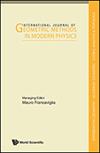Quantum Detection Problem for Fusion Frames
IF 2.1
3区 物理与天体物理
Q2 PHYSICS, MATHEMATICAL
International Journal of Geometric Methods in Modern Physics
Pub Date : 2023-11-04
DOI:10.1142/s0219887824500671
引用次数: 0
Abstract
A quantum injective frame is a frame whose measurements for density operators can be used as a distinguishing feature in a quantum system, and the frame quantum detection problem demands a characterization of all such frames. Very recently, the quantum detection problem for continuous as well as discrete frames in both finite and infinite dimensional Hilbert spaces received significant attention. The quantum detection problem pertaining to the characterization of informationally complete positive operator-valued measures (POVM) can be split into two cases: The quantum injectivity or state separability problem and the rang analysis or quantum state estimation problem. Building upon this notion, this note is aimed at the quantum detection problem for fusion frames. The injectivity of a family of vectors and a family of closed subspaces is characterized in terms of some operator equations in Hilbert–Schmidt and trace classes.融合帧的量子检测问题
量子注入框架是一种框架,其密度算子的测量可以用作量子系统中的一个显著特征,框架量子检测问题需要对所有这些框架进行表征。最近,有限维和无限维希尔伯特空间中连续和离散帧的量子检测问题受到了极大的关注。与信息完备的正算子值测度(POVM)表征相关的量子检测问题可分为两种情况:量子注入性或状态可分性问题和距离分析或量子状态估计问题。在这个概念的基础上,本笔记旨在解决融合框架的量子检测问题。用Hilbert-Schmidt和迹类中的算子方程刻画了向量族和闭子空间族的内射性。
本文章由计算机程序翻译,如有差异,请以英文原文为准。
求助全文
约1分钟内获得全文
求助全文
来源期刊
CiteScore
3.40
自引率
22.20%
发文量
274
审稿时长
6 months
期刊介绍:
This journal publishes short communications, research and review articles devoted to all applications of geometric methods (including commutative and non-commutative Differential Geometry, Riemannian Geometry, Finsler Geometry, Complex Geometry, Lie Groups and Lie Algebras, Bundle Theory, Homology an Cohomology, Algebraic Geometry, Global Analysis, Category Theory, Operator Algebra and Topology) in all fields of Mathematical and Theoretical Physics, including in particular: Classical Mechanics (Lagrangian, Hamiltonian, Poisson formulations); Quantum Mechanics (also semi-classical approximations); Hamiltonian Systems of ODE''s and PDE''s and Integrability; Variational Structures of Physics and Conservation Laws; Thermodynamics of Systems and Continua (also Quantum Thermodynamics and Statistical Physics); General Relativity and other Geometric Theories of Gravitation; geometric models for Particle Physics; Supergravity and Supersymmetric Field Theories; Classical and Quantum Field Theory (also quantization over curved backgrounds); Gauge Theories; Topological Field Theories; Strings, Branes and Extended Objects Theory; Holography; Quantum Gravity, Loop Quantum Gravity and Quantum Cosmology; applications of Quantum Groups; Quantum Computation; Control Theory; Geometry of Chaos.

 求助内容:
求助内容: 应助结果提醒方式:
应助结果提醒方式:


